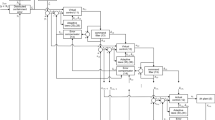Abstract
Event-triggered control aims at reducing the communication load over the feedback link in networked control systems by sending information only if certain event conditions, which guarantee a desired control performance, are satisfied. This article investigates the consequences of actuator saturation on the behavior of the event-triggered control loop in terms of its stability and information exchange. Stability properties are derived using linear matrix inequalities (LMIs) which show how the stability of the event-triggered control loop depends on the selection of the event threshold. Moreover, it is shown that a lower bound on the minimum inter-event time exists being likewise affected by the event threshold. As actuator saturation might severely degrade the performance of the event-triggered closed-loop system, the scheme is extended by incorporating an anti-windup mechanism in order to overcome this problem. The results are illustrated by simulations and experiments.












Similar content being viewed by others
References
Anta A, Tabuada P (2010) To sample or not to sample: self-triggered control for nonlinear systems. IEEE Trans Automat Contr 55(9):2030–2042
Årzén KE (1999) A simple event-based PID controller. In: Proceedings of IFAC world congress, Beijing, pp 423–428
Åström KJ, Bernhardsson B (1999) Comparison of periodic and event based sampling for first-order stochastic systems. In: Proceedings of IFAC world congress, Beijing, pp 301–306
Åström KJ, Hägglund T (1995) PID controllers: theory, design, and tuning, ISA
Baillieul J, Antsaklis P (2007) Control and communication challenges in networked real-time systems. Proc IEEE 95(1):9–28
Bemporad A, Heemels WPMH, Johansson M (2010) Networked control systems. In: Lecture notes in control and information sciences. Springer
Blanchini F (1999) Set invariance in control. Automatica 35(11):1747–1767
Cassandras CG, Lafortune S (2008) Introduction to discrete event systems. Springer, New York
Cervin A, Henningsson T (2008) Scheduling of event-triggered controllers on a shared network. In: Proceedings of IEEE conference on decision and control, Cancun, pp 3601–3606
Donkers MCF, Heemels WPMH (2010) Output-based event-triggered control with guaranteed \(\mathcal{L}\) ∞ -gain and improved event-triggering. In: Proceedings of IEEE conference on decision and control, Atlanta
Heemels WPMH, Gorter RJA, van Zijl A, van den Bosch PPJ, Weiland S, Hendrix WHA, Vonder MR (1999) Asynchronous measurement and control: a case study on motor synchronization. Control Eng Pract 7(12):1467–1482
Heemels WPMH, Sandee J, van den Bosch P (2008) Analysis of event-driven controllers for linear systems. Int J Control 81(4):571–590
Lehmann D (2011) Event-based state-feedback control. Logos Verlag, Berlin
Lehmann D, Johansson KH (2012) Event-triggered PI control subject to actuator saturation. In: Proceedings of IFAC conference on advances in PID control, Brescia
Lehmann D, Kiener GA, Johansson KH (2012) Event-triggered PI control: saturating actuators and anti-windup compensation. In: IEEE conference on decision and control (accepted)
Lehmann D, Lunze J (2011) Extension and experimental evaluation of an event-based state-feedback approach. Control Eng Pract 19(2):101–112
Löfberg J (2004) YALMIP: a toolbox for modeling and optimization in MATLAB. In: Proceedings of the CACSD conference, Taipei
Lunze J, Lamnabhi-Lagarrigue F (2009) Handbook of hybrid systems control. Cambridge University Press, Cambridge, UK
Lunze J, Lehmann D (2010) A state-feedback approach to event-based control. Automatica 46(1):211–215
Nair GN, Fagnani F, Zampieri S, Evans RJ (2007) Feedback control under data rate constraints: an overview. Proc IEEE 95(1):108–137
Otanez PG, Moyne JG, Tilbury DM (2002) Using deadbands to reduce communication in networked control systems. In: Proceedings of American control conference, Anchorage, pp 3015–3020
Tabuada P (2007) Event-triggered real-time scheduling of stabilizing control tasks. IEEE Trans Automat Contr 52(9):1680–1685
Tarbouriech S, Garcia G, Gomes da Silva Jr JM, Queinnec I (2011) Stability and stabilization of linear systems with saturating actuators. Springer, London
Tarbouriech S, Prieur C, Gomes da Silva Jr JM (2006) Stability analysis and stabilization of systems presenting nested saturations. IEEE Trans Automat Contr 51(8):1364–1371
Tiberi U, Araújo J, Johansson KH (2012) On event-based PI control of first-order processes. In: Proceedings of IFAC conference on advances in PID control, Brescia
Tipsuwan Y, Chow MY (2003) Control methodologies in networked control systems. Control Eng Pract 11:1099–1111
Vasyutynskyy V, Kabitzsch K (2006) Implementation of PID controller with send-on-delta sampling. In: Proceedings of international control conference, Glasgow
Wang X, Lemmon MD (2009) Self-triggered feedback control systems with finite-gain \(\mathcal{L}\) 2 stability. IEEE Trans Automat Contr 54(3):452–467
Zaccarian L, Teel AR (2011) Modern anti-windup synthesis: control augmentation for actuator saturation, Princeton
Zhang W, Branicky MS, Philips SM (2001) Stability of networked control systems. IEEE Control Syst Mag 21(1):84–99
Author information
Authors and Affiliations
Corresponding author
Additional information
This work was supported by the VINNOVA project WiComPI, the Knut and Alice Wallenberg Foundation, the Swedish Research Council, and the HYCON2 EU project.
Rights and permissions
About this article
Cite this article
Kiener, G.A., Lehmann, D. & Johansson, K.H. Actuator saturation and anti-windup compensation in event-triggered control. Discrete Event Dyn Syst 24, 173–197 (2014). https://doi.org/10.1007/s10626-012-0151-1
Received:
Accepted:
Published:
Issue Date:
DOI: https://doi.org/10.1007/s10626-012-0151-1




